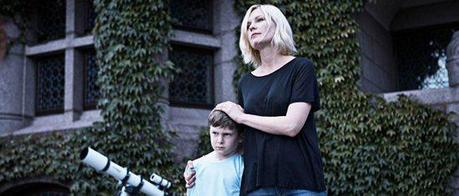Contributor: Andy Spencer
Writer: Lars von Trier
Director: Lars von Trier
Lars von Trier is a controversial figure in the film industry. His jokes about Naziism made him the first persona non grata at the Cannes Film Festival (where this film was first shown). His previous picture, “Antichrist”, contained some of the most horrific acts I have ever seen in a film. Truth be told, he reminds me a bit of Mel Gibson, without the violent outbursts.

And, like Mel Gibson and his masterful “Apocalypto”, von Trier demonstrates that even a lunatic can make good movies. “Melancholia” is definitely a von Trier film, with many of his trademark techniques on display. This will, of course, make this film an extremely divisive one, and that many viewers who are just in it for thrills will be extremely disappointed by. However, those with an eye for character development and artful filmmaking of a standard sci-fi scenario will leave completely satisfied.
“Melancholia”, like “Antichrist” and many of von Trier’s films before it, begins with a montage of images set to a musical piece. Each of these shots are so beautiful and artistically done that each one could easily be its own painting. The sad montage ends with a final shot of an enormous planet colliding with and destroying planet Earth.
Now, at this point, it is only natural to wonder about why anyone should watch the rest of this movie if the end is revealed at the beginning. The answer: because this is a full-on character study, rather than a disaster film. This aspect is, with scant exception, incredibly well-done. Just prior to commencing work on this film, von Trier suffered from clinical depression. Though he was able to get through it (or so he says), it is reflected almost constantly in “Melancholia”.
The characters are stark, vivid portraits of emotion. Kirsten Dunst, in what has to be the finest performance of her career thus far, is depressed, and honest to a fault. Though she often requires significant help from those around her, and she does not hesitate to tell them what she thinks of them and their actions, she is able to accept the coming doom, and recognize that panic will not solve anything. Her sister, portrayed by von Trier regular Charlotte Gainsbourg, seems to represent what we feel but do not want to admit. At first, she expresses the opinion that, despite scientific evidence to the contrary, the rogue planet Melancholia will, indeed, hit Earth. And later, when this becomes abundantly clear, she hopes against hope that there is some shelter from the looming disaster.
The story, though simple, is told very elegantly. Justine (Dunst) is about to get married at her brother-in-law’s (Kiefer Sutherland) estate. Thing do not work out, to say the least, with her inexplicably bitter mother almost ruining the proceedings single-handedly. The wedding is eventually called off as Justine is not present for the majority of the proceedings. Instead she is bathing, putting her nephew to bed, or having sex with some man whom she just met hours prior. Afterwards, Justine chooses to reside at her brother-in-law’s home, where she rapidly takes interest in a planet set to pass by Earth in a fly-by. Though this does come to pass, Melancholia does eventually collide with Earth, reducing it to dust in a matter of minutes.
Despite the almost-unwaveringly grim subject matter, this film is so beautiful and poetic that it almost manages to transcend its medium, becoming an experience, rather than simply a motion picture. The handheld camera used in the first half of the film manages to create the illusion of reality, while the more traditionally-filmed second half manages to create an artfully apocalyptic expression of base emotion. Few films have even attempted such a feat, let alone succeeded in this mission.
SCORE: 10/10

